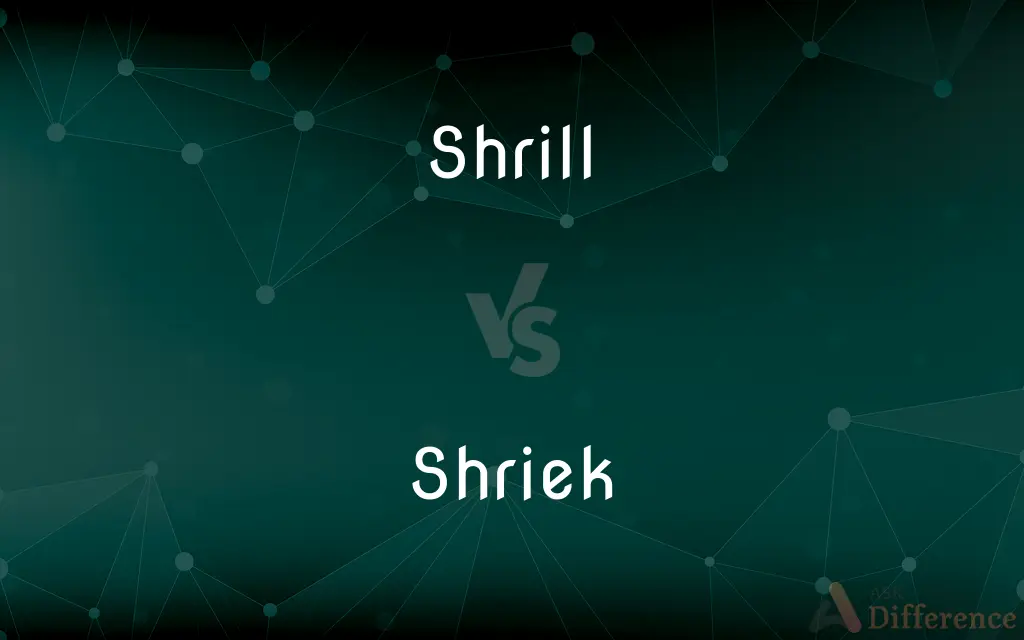Shrill vs. Shriek — What's the Difference?
By Urooj Arif & Fiza Rafique — Updated on April 26, 2024
Shrill describes a high-pitched, piercing sound, often unpleasant; shriek refers to a loud, high-pitched cry or sound, typically indicating fear or excitement.

Difference Between Shrill and Shriek
Table of Contents
ADVERTISEMENT
Key Differences
Shrill is an adjective used to describe sounds that are high-pitched and piercing, often in a way that can be irritating or hard to ignore. On the other hand, shriek is a verb that describes the act of emitting a sharp, high-pitched sound, usually as a reaction to extreme emotion.
While shrill can apply to any consistent noise, such as the shrill ring of an alarm or a voice, shrieking is specifically associated with vocal sounds made by people or animals, often in response to fear, excitement, or surprise.
The term shrill is often used in a somewhat negative context, as it implies a quality of sound that is not only high-pitched but also unpleasantly piercing. In contrast, a shriek may not always carry a negative connotation and can express positive extremes of emotion, such as excitement or joy.
Shrill sounds can be continuous or sustained, making them particularly noticeable in noisy environments. Conversely, shrieking is typically a brief and sudden reaction to a stimulus, not meant to be sustained over time.
In literature and daily speech, "shrill" might be used to describe intangible things metaphorically, like a "shrill warning." Whereas "shriek" remains largely literal, used to describe actual high-pitched vocal expressions.
ADVERTISEMENT
Comparison Chart
Definition
Adjective describing high-pitched sounds
Verb describing the act of making loud sounds
Context of Usage
Continuous noise, alarms, voices
Sudden vocal reaction to emotion
Emotional Connotation
Often negative, irritating
Can be negative or positive, intense
Duration
Can be sustained
Typically brief and sudden
Usage in Speech
Describes sound quality
Describes an action
Compare with Definitions
Shrill
Often used to characterize alarms and screams.
Her voice was shrill with panic.
Shriek
Often sudden and loud.
He shrieked in pain after stubbing his toe.
Shrill
Can be irritating or difficult to ignore.
The shrill cry of the bird kept me awake.
Shriek
Rarely sustained, typically a brief sound.
The shriek of the hawk signaled its presence.
Shrill
Associated with loud and high frequencies.
The old machine made a shrill noise.
Shriek
Indicates a strong emotional response.
The fans shrieked with joy at the concert.
Shrill
Describes a high, piercing sound quality.
The whistle's shrill sound hurt my ears.
Shriek
A verb that means to emit a sharp, high-pitched sound.
She shrieked in surprise when she saw the spider.
Shrill
Sometimes used metaphorically in speech.
The news article carried a shrill warning about the storm.
Shriek
Used to describe vocal reactions.
The toddler's shriek could be heard across the playground.
Shrill
(of a voice or sound) high-pitched and piercing
A shrill laugh
Shriek
Utter a high-pitched piercing sound or words, especially as an expression of terror, pain, or excitement
She was shrieking abuse at a taxi
The audience shrieked with laughter
‘There it is!’ she shrieked
Shrill
Make a shrill noise
A piercing whistle shrilled through the night air
Shriek
A high-pitched piercing cry or sound; a scream
Shrieks of laughter
Shrill
A shrill sound or cry
The shrill of a smoke detector filled the air
Shriek
An exclamation mark.
Shrill
High-pitched and piercing in tone or sound
The shrill wail of a siren.
Shriek
A shrill, often frantic cry.
Shrill
Producing a sharp, high-pitched tone or sound
A shrill fife.
Shriek
A sound suggestive of such a cry.
Shrill
Sharp or keen to the senses; harshly vivid
Shrill colors.
Shriek
To utter a shriek.
Shrill
To utter in a shrill manner; scream.
Shriek
To make a sound similar to a shriek.
Shrill
To produce a shrill cry or sound.
Shriek
To utter with a shriek.
Shrill
High-pitched and piercing.
The woods rang with shrill cries of the birds.
Shriek
A sharp, shrill outcry or scream; a shrill wild cry such as is caused by sudden or extreme terror, pain, or the like.
Shrill
Having a shrill voice.
Shriek
An exclamation mark.
Shrill
Sharp or keen to the senses.
Shriek
(intransitive) To utter a loud, sharp, shrill sound or cry, as do some birds and beasts; to scream, as in a sudden fright, in horror or anguish.
Shrill
Fierce, loud, strident.
Shriek
(transitive) To utter sharply and shrilly; to utter in or with a shriek or shrieks.
Shrill
To make a shrill noise.
Shriek
To utter a loud, sharp, shrill sound or cry, as do some birds and beasts; to scream, as in a sudden fright, in horror or anguish.
It was the owl that shrieked.
At this she shrieked aloud; the mournful trainEchoed her grief.
Shrill
A shrill sound.
Shriek
To utter sharply and shrilly; to utter in or with a shriek or shrieks.
On top whereof aye dwelt the ghostly owl,Shrieking his baleful note.
She shrieked his nameTo the dark woods.
Shrill
Acute; sharp; piercing; having or emitting a sharp, piercing tone or sound; - said of a sound, or of that which produces a sound.
Hear the shrill whistle which doth order giveTo sounds confused.
Let winds be shrill, let waves roll high.
Shriek
A sharp, shrill outcry or scream; a shrill wild cry such as is caused by sudden or extreme terror, pain, or the like.
Shrieks, clamors, murmurs, fill the frighted town.
Shrill
A shrill sound.
Shriek
Sharp piercing cry;
Her screaming attracted the neighbors
Shrill
To utter an acute, piercing sound; to sound with a sharp, shrill tone; to become shrill.
Break we our pipes, that shrilledloud as lark.
No sounds were heard but of the shrilling cock.
His voice shrilled with passion.
Shriek
A high-pitched noise resembling a human cry;
He ducked at the screechings of shells
He heard the scream of the brakes
Shrill
To utter or express in a shrill tone; to cause to make a shrill sound.
How poor Andromache shrills her dolors forth.
Shriek
Utter a shrill cry
Shrill
Utter a shrill cry
Shrill
High-pitched and sharp;
Piercing screams
A shrill whistle
Common Curiosities
What emotions typically cause a person to shriek?
People often shriek in response to intense emotions such as fear, excitement, or sudden pain.
Can instruments produce a shriek?
Typically, "shriek" is used to describe human or animal vocal sounds, but metaphorically, it can describe very high-pitched sounds from instruments.
Can machinery shriek?
Yes, if machinery makes sudden, very high-pitched noises, it can metaphorically be said to shriek, though this usage is less common.
Is a shrill sound always loud?
A shrill sound is not necessarily loud in volume but is high in pitch and piercing in quality, making it stand out.
Can the term shrill be used positively?
It's rare; "shrill" usually has a negative connotation due to the irritating quality of the sounds it describes.
How do authors use the word "shrill" effectively in literature?
Authors use "shrill" to describe sounds that enhance the atmosphere, often in tense or dramatic scenes.
What makes a sound shrill?
A sound is described as shrill when it is high-pitched and piercing, often to the point of being unpleasant.
What is the difference between screaming and shrieking?
Screaming can vary in pitch and is more sustained, while shrieking is specifically high-pitched and usually brief.
Why might someone describe a voice as shrill?
A voice might be described as shrill if it becomes high-pitched and piercing, often when someone is agitated or excited.
Can animals shriek?
Yes, many animals, particularly birds, can shriek as part of their vocalizations.
What adjustments can be made if a device is too shrill?
Adjusting the frequency settings or dampening the sound can help reduce the shrillness of a device's noise.
What are common situations in which someone might shriek?
Common situations include experiencing a surprise, intense excitement at an event, or reacting to sudden pain or fear.
Is it derogatory to describe someone's talking voice as shrill?
It can be perceived as derogatory because it emphasizes an unpleasant sound quality, often used in a critical context.
Is shrieking considered a vocal talent or skill?
Shrieking itself is not typically considered a talent or skill, as it is a natural, instinctive response to stimuli rather than a controlled vocal technique.
How do you differentiate a shrill sound from a loud one?
A shrill sound is defined more by its high pitch and piercing quality rather than its volume, which can vary.
Share Your Discovery

Previous Comparison
Perception vs. Intuition
Next Comparison
Cart vs. CardAuthor Spotlight
Written by
Urooj ArifUrooj is a skilled content writer at Ask Difference, known for her exceptional ability to simplify complex topics into engaging and informative content. With a passion for research and a flair for clear, concise writing, she consistently delivers articles that resonate with our diverse audience.
Co-written by
Fiza RafiqueFiza Rafique is a skilled content writer at AskDifference.com, where she meticulously refines and enhances written pieces. Drawing from her vast editorial expertise, Fiza ensures clarity, accuracy, and precision in every article. Passionate about language, she continually seeks to elevate the quality of content for readers worldwide.














































